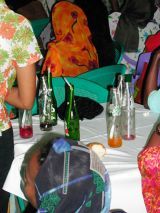Alcohol production highlights division between North and South Sudan
Oct 16, 2005 (KHARTOUM) — Life is difficult in northern Sudan for southern Sudanese displaced by civil war. Many have little or no education, and most cannot find decent jobs. Brewing alcohol in their homes is one way southern Sudanese women earn money to support their families. But they also risk arrest, because liquor is illegal under Sudan’s strict Islamic law. The mostly Christian southerners feel they should not have to obey Islamic law.
 There is a celebration in Haj Yousef, a ghetto on the outskirts of Khartoum, which houses displaced southern Sudanese. The celebration, called a Karam, marks the reunion of a husband and wife who have been apart.
There is a celebration in Haj Yousef, a ghetto on the outskirts of Khartoum, which houses displaced southern Sudanese. The celebration, called a Karam, marks the reunion of a husband and wife who have been apart.
Mary Paul has returned to her husband after eight months visiting relatives in south Sudan. She is sharing her celebration with three friends who have just been released from prison.
The women were incarcerated for brewing alcohol, which is illegal under Sudan’s strict Islamic code of law, called Shari’a. But southern Sudanese women, who often have little education and many children, find that brewing cheap alcohol in their homes is one way to earn money to feed themselves and their families.
Although it is illegal, the production and sale of liquor in Sudan is rampant. Last spring, Sudan’s Interior Ministry announced it was beginning a campaign to close down illegal breweries.
Gizenga Willow Yamba, a displaced southern Sudanese who works with a Canadian relief organization in camps for internally displaced, says many southern women are sent to prison each month for illegal brewing in and around Khartoum.
“The number of women is ranging over 200 women in prison, because of brewing. This means what? This means the consumption is there. It is not open, but it is being smuggled,” he says.
Mr. Yamba says northern and southern Sudanese drink alcohol, but the brewers are mainly southern women who produce the alcohol in their homes, risking arrest.
Three weeks to one month in prison, plus a fine, is the usual sentence for brewers or drinkers. If no fine is paid, the sentence is extended to two months in jail.
Anjuma Henry spent three weeks in prison for brewing zenzibel, a potent liquor made from a fruit of the same name. Ms. Henry began brewing alcohol because she could find no other work. She has only completed school through the seventh grade and strong racist sentiment in the north often prevents southern Sudanese from attaining work.
Local Christian churches have been pleading with parishioners to stop brewing liquor. The home brews can also be dangerous because of additives that can be potentially lethal. Last March, 20 Sudanese died and six others were blinded after drinking from a particularly strong batch of alcohol.
Alcohol brewing is one component of the strong cultural conflict between the mostly Muslim north and mostly Christian south Sudanese. Alcohol is forbidden under Islamic law. A campaign by the Khartoum government to enforce Islamic laws across the country was one reason for Sudan’s two-decade war. A January peace agreement ended the war, but the hostility continues.
Carmella Angelo was imprisoned for three weeks for brewing a potent date liquor, called aragi. She says the guards in the prison mocked and humiliated her for being a southern Sudanese.
She says, “In the prison, the police provoked the women constantly.” They asked questions like “Now, after the peace agreement, do you want to return to the south or do you want to stay in the north?” She says the police asked, “why don’t you go home?” She says the women told them, “We want to go back to the south immediately.”
Along with the humiliation, the women said they lived in deplorable conditions in the prisons.
Theresa Ancheto also spent three weeks in prison. It was her second time in jail for illegal brewing.
She says conditions in the prison were terrible. “It was very difficult to get food and water, even for the pregnant women.” She says the women were humiliated, the guards beat them and insulted them for no reason.
The women who brew alcohol are afraid of going back to prison. But the little money they earn is a powerful incentive for them to continue taking the risk.
Mary Joseph was released from prison one-year ago. She says she tried to find legitimate work, but could not. She has returned to brewing alcohol in her home to support herself and her two children.
She says she is afraid of going back to prison. But there is no way out. She says she’s not educated and has no certificates, and that is how you get a good job. She says that is why she is surviving on alcohol. She says, if she could get another job, she would do something else, “but, right now, there is nothing.”
The three women who were recently released from prison say they will not return to brewing alcohol. But they acknowledge they have few other prospects.
(VOA/ST)
